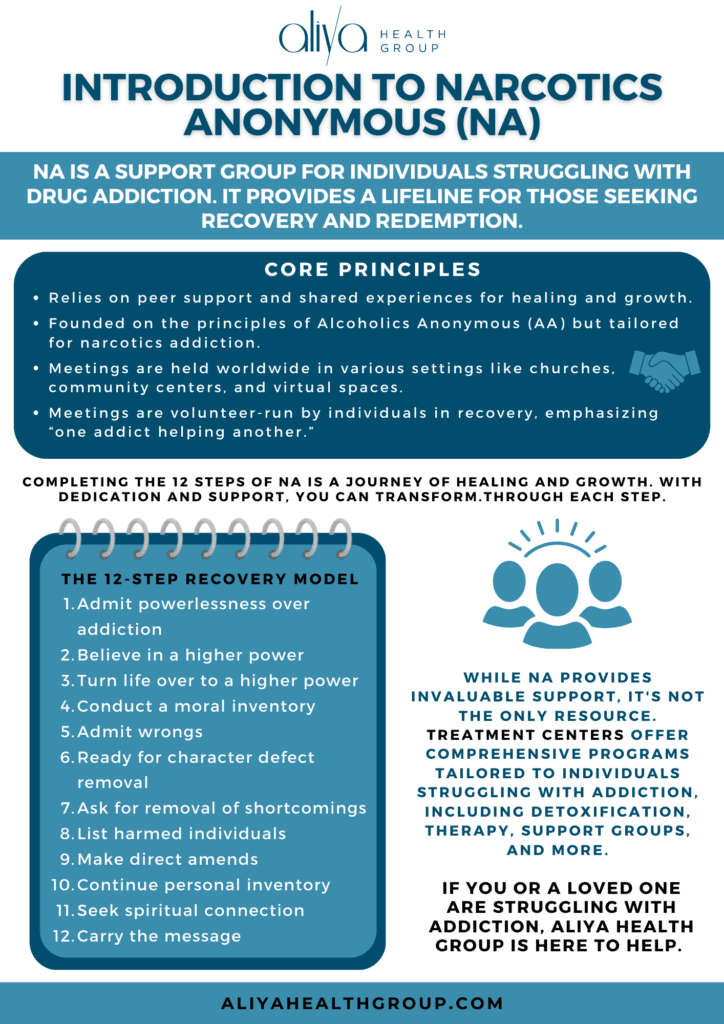Following addiction treatment, many struggle to maintain their sobriety. If that’s you, then the 12 Steps of Narcotics Anonymous (NA) may offer the support you’ve been searching for. In this comprehensive guide, we’ll explore what NA is, outline the 12 steps of NA, and offer helpful recovery tips. We will also shed light on additional avenues for assistance.
What Is NA?
Narcotics Anonymous, often abbreviated as NA, is a support group for individuals grappling with drug addiction. It’s more than just an organization—it’s a lifeline for those seeking to recover from substance abuse. But what exactly is NA, and how does it operate?
At its core, Narcotics Anonymous is a global, community-based fellowship dedicated to assisting individuals in overcoming narcotics addiction. Unlike traditional treatment programs, NA relies on the power of peer support and shared experiences to foster healing and growth. It’s a space where people can come together in solidarity, free from judgment. For this reason, people who join NA can find solace, strength, and guidance on their journey to sobriety.
The origins of NA can be traced back to the founding principles of Alcoholics Anonymous (AA) in the 1930s. As AA gained recognition for its groundbreaking 12-step recovery model, individuals struggling with narcotics saw the need for a similar support system. Thus, Narcotics Anonymous was born. As a sister organization to AA, NA is founded on the same principles of fellowship, mutual aid, and spiritual growth. While AA’s focus is on alcohol addiction, NA is tailored to people in recovery for drug addiction.
NA Meetings
NA meetings can be found in communities worldwide, spanning continents and cultures. These meetings take place in a variety of settings, including churches, community centers, and even virtual spaces. What sets NA apart is its grassroots nature. All meetings are run by volunteers who are themselves in recovery, emphasizing the principle of “one addict helping another.”
12-Step Model
At the heart of NA lies the 12-step recovery model, a guiding framework for personal transformation and spiritual awakening. Adapted from the original 12 steps of Alcoholics Anonymous, these principles serve as a roadmap to recovery. As people progress through the 12 steps, they can learn to maintain their sobriety and reclaim their lives. From admitting powerlessness over addiction to making amends, each step represents a crucial stage of the recovery journey.
NA Recovery Community
NA is more than just a recovery program. It’s a community, a family, and a source of unwavering support for those in need. NA a testament to the power of connection and compassion in the face of adversity. It offers hope where there was once despair and a path forward where all seemed lost.
Healing From Drug Addiction In Narcotics Anonymous
Narcotics Anonymous is a beacon of light in the darkness of drug addiction, a lifeline for those who dare to dream of a better tomorrow. Through fellowship, faith, and unwavering commitment, NA stands as a testament to the resilience of the human spirit. As an NA member, people can bask in the boundless potential for recovery and renewal.

Get confidential help from our addiction and mental health treatment facilities located across the United States. Call to join one of our quality programs today!
Speak With Our Admissions TeamWhat Are the 12 Steps of NA?
The 12 steps of Narcotics Anonymous (NA) represent a transformative journey toward recovery from drug addiction. These steps serve as a roadmap for individuals seeking to break free from the cycle of substance abuse and embrace a life of sobriety, spirituality, and personal growth.
While each step presents its own unique challenges and opportunities for growth, steps 1, 4, and 9 tend to be the most difficult to navigate for many NA members. Having dedication and willingness is key. To help you get a better understanding of the 12 Steps of NA, we have outlined them below with an explanation of what each step means and what it requires.
Step 1: We admitted we were powerless over our addiction, that our lives had become unmanageable.
The first step is about acknowledging the grip that addiction has on our lives. It requires a humble acceptance of our powerlessness over drugs. It’s recognizing that our lives have become chaotic and unmanageable as a result.
Step 2: Came to believe that a Power greater than ourselves could restore us to sanity.
In the second step, we open ourselves to the possibility of a higher power—a force beyond our own understanding—that can guide us toward healing and restoration. It’s about cultivating faith and trust in something greater than ourselves to help us find clarity and sanity amidst the chaos of addiction.
Step 3: Made a decision to turn our will and our lives over to the care of God as we understood Him.
Step three involves surrendering our will and ego to a higher power, as we understand it. It’s an act of relinquishing control and placing our faith in a spiritual principle to guide our actions and decisions moving forward.
Step 4: Made a searching and fearless moral inventory of ourselves.
The fourth step is a thorough self-examination—a fearless inventory of our past behaviors, actions, and motivations. It requires honesty, introspection, and a willingness to confront the shadows lurking within ourselves.
Step 5: Admitted to God, to ourselves, and to another human being the exact nature of our wrongs.
Step five is about owning up to our past mistakes and wrongdoings. It involves confessing our shortcomings and character defects to a higher power, ourselves, and another trusted individual—a process that fosters accountability, humility, and the courage to seek forgiveness and redemption.
Step 6: Were entirely ready to have God remove all these defects of character.
In the sixth step, we build toward letting go of our character defects and shortcomings, trusting in the transformative power of a higher power to guide us toward personal growth and spiritual evolution.
Step 7: Humbly asked Him to remove our shortcomings.
Step seven is a prayer for divine intervention. It’s an earnest request for our higher power to help us shed the burdens of our past and lead us toward a brighter future. It’s an act of humility, surrender, and trust in the process of spiritual healing.
Step 8: Made a list of all persons we had harmed and became willing to make amends to them all.
In the eighth step, we take inventory of the harm we’ve caused others as a result of our addiction. We compile a list of individuals we’ve wronged and cultivate a genuine willingness to make amends and seek forgiveness for our past actions.
Step 9: Made direct amends to such people wherever possible, except when to do so would injure them or others.
Step nine involves taking concrete action to make amends for the harm we’ve inflicted on others. It requires humility, sincerity, and a commitment to repairing the damage done, while also respecting the well-being of those we’ve harmed.
Step 10: Continued to take personal inventory and when we were wrong promptly admitted it.
The tenth step is about maintaining ongoing self-awareness and accountability. It involves regularly assessing our thoughts, actions, and behaviors, and promptly admitting when we’ve veered off course. It’s a practice of honesty, humility, and continual growth.
Step 11: Sought through prayer and meditation to improve our conscious contact with God as we understood Him, praying only for knowledge of His will for us and the power to carry that out.
Step eleven emphasizes the importance of spiritual connection and mindfulness. It encourages us to cultivate a deeper relationship with our higher power through prayer, meditation, and reflection, seeking guidance and strength to align our actions with divine will.
Step 12: Having had a spiritual awakening as the result of these steps, we tried to carry this message to addicts, and to practice these principles in all our affairs.
The final step is about embracing the transformative power of the 12-step journey and paying it forward. It involves sharing our experience, strength, and hope with others who are struggling with addiction. It’s about embodying the principles of recovery in all aspects of our lives. It’s a commitment to service, compassion, and the ongoing pursuit of spiritual growth.
Looking for quality treatment for substance abuse and mental health that’s also affordable? Aliya Health Group's treatment facilities accept most major insurance providers. Get a free insurance benefits check now!
Check Your CoverageHow to Complete All 12 Steps of NA
Completing the 12 steps of Narcotics Anonymous (NA) is a transformative journey of self-discovery, healing, and spiritual growth. Although it may seem challenging, with dedication, support, and a willingness to change, you can successfully navigate each step. Here are some tips to help:
- Take it One Step at a Time: Recovery is a journey, not a destination. Approach each step with patience and mindfulness, focusing on the present. Remember, progress is made one step at a time.
- Seek Support: Don’t go it alone. Lean on your fellow NA members, sponsors, and supportive friends and family members for guidance, encouragement, and accountability.
- Be Honest and Open-minded: Honesty is key in recovery. Face your past with honesty and openness. Be open to new ideas and perspectives that challenge your beliefs.
- Work with a Sponsor: A sponsor is a mentor who has been through the recovery process. Choose someone you respect and trust, and be open to their advice.
- Practice Self-Compassion: Recovery is a journey of self-discovery and growth, and it’s okay to stumble along the way. Be gentle with yourself, celebrate your progress, and forgive setbacks.
- Attend Meetings: Commit to regularly attend meetings and actively participate by sharing your experiences, listening to others, and contributing to the fellowship.
- Practice Spiritual Principles: The 12 steps of NA are based on spiritual principles like honesty, humility, and service. To connect with your higher power and follow its guidance, apply these principles daily through prayer, meditation, and acts of kindness.
By following these tips and embracing the journey, you can achieve long-term recovery from drug abuse through the 12 steps of NA.
Who Else Offers Help for Drug Addiction?
While NA provides invaluable support for individuals in recovery, it’s not the only resource available. Drug rehab centers offer comprehensive programs tailored to address the unique needs of individuals struggling with addiction. During these programs, addiction treatment services can include:
- Detoxification: Drug detox programs provide a safe and supervised environment for individuals to withdraw from drugs or alcohol under medical supervision.
- Medication-Assisted Treatment (MAT): MAT services combine FDA-approved medications with drug addiction counseling and behavioral therapies to treat substance use disorders effectively.
- Therapy: Various therapeutic approaches, such as cognitive-behavioral therapy (CBT), dialectical behavior therapy (DBT), and motivational interviewing, can help individuals address underlying issues contributing to their addiction and develop coping strategies for maintaining sobriety.
- Support Groups: In addition to NA, there are numerous support groups and organizations dedicated to helping individuals in recovery, such as SMART Recovery and Celebrate Recovery.
Drug Addiction Treatment at Aliya Health Group
Through an Aliya Health Group rehab program, you can access the comprehensive support you need to embark on the journey to recovery with confidence and determination. Our drug detox and rehab centers provide a full continuum of care for addictive substances such as benzo, stimulant, and opioid treatment. Our integrated treatment approach for drug addiction offers both evidence-based and holistic recovery practices. Please contact us today to learn how we can help you learn more about 12-step programs and mutual support groups for addiction therapy.
We can also help with insurance verification for rehab, finding NA meetings near you, and answering any questions you may have about support groups and addiction recovery in general. Recovery from drug addiction is possible, and our behavioral health and dual diagnosis treatment centers can help.

















